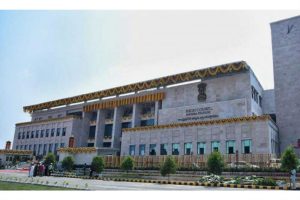Andhra Pradesh High Court: M. Satyanarayana Murthy, J., reiterated that,
Right to vote and right to elect a representative of their own choice in free and fair election is a fundamental right guaranteed under the Constitution.
Background
The instant matter was preferred by Bharatiya Janata Party (BJP) seeking for the issuance of Writ of Mandamus – declaring the Notification No.68/SEC-B1/2020 dated 15-03-2020 and the consequential Notification dated 06-05-2020 of the first respondent to the extent of recommencement of election process of Mandal Praja Parishads Territorial Constituencies (MPTCs) and Zilla Praja Parishads Territorial Constituencies (ZPTCs) in State of Andhra Pradesh from the stage where it was stopped — as illegal, Irregular, arbitrary, unconstitutional unjustified, unsustainable and contrary to the A.P. Panchayat Raj Act and Rules framed.
Petitioners wanted to work for betterment of their town by contesting in the elections in their respective Mandal Praja Parishads Territorial Constituencies (MPTCs) and Zilla Praja Parishads Territorial Constituencies (ZPTCs).
Contentions
Article 40 and Self Government
Article 40 of the Constitution of India while laying down the directive principles of State Policy in its Part IV expected that the local bodies should be endowed with such powers and authority as may be necessary to enable them to function as units of the self-government.
Article 243-G contemplates that the Panchayats shall be endowed with such powers and authority as may be necessary to enable them to function as institutions as self-government.
According to Article 243 K (1), the superintendence direction and control of the preparation of Electoral Rolls and the conduct of all elections to the Panchayats is vested in the State Election Commission.
It was stated that as per Article 243-K read with Section 200 of Andhra Pradesh Panchayat Raj Act, 1994, the State Election Commissioner is appointed by the State Governor.
The main endeavour of the petitioners was that, when election Notification was issued initially on 07-03-2020 and fixed schedule for elections, the petitioners were not eligible and not enrolled as voters, as they were below 21 years. But, during interregnum period, they attained the majority of 21 years of age and enrolled as voters. However, due to the Covid-19 pandemic, elections were postponed indefinitely.
Right to Vote and Contest in the Elections
Vide Notification, 06-05-2020 the first respondent stopped the election process. Later, Vide Notification dated 01-04-2021 respondent proposed to conduct elections for ZPTCs and MPTCs from the stage where it was stopped was without re-notifying the election, exercising power under Rule 7 of the Rules.
Petitioners were deprived of casting their vote and to contest in the elections for MPTCs and ZPTCs, a constitutional right guaranteed under the Constitution of India.
Analysis
Petitioners were registered voters as on the date of Notification dated 07-03-2020 as they did not attain 21 years of age.
Elections to the legislative assemblies of the State and public bodies like ZPTC, MPTC, Urban Local Bodies etc. is based on “Adult Suffrage”, as enunciated under Article 326 of the Constitution of India.
Petitioners were not eligible for their enrolment as voters, as they were below 21 years by the date of notification.
In view of the Supreme Court’s decision in the matter, the State Election Commissioner was required to resume the election process from where it was paused by re-imposing 4 weeks Model Code of Conduct prior to the notified date of polling.
In view of the above decision, first respondent could not have exercised power under Rule 7 of the Rules and re-notify the election process to accommodate the petitioners to contest in the elections or to vote or to elect their representative.
Further, it was added that if the request would have been accepted, holding elections would have been a difficult task for anyone, since it is an unending process, for the reason, that, many persons may attain 21 years of age and become eligible between the date of notification till date of polling, thereby, it will be impossible to hold elections to public bodies by the State Election Commission.
Supreme Court in the decision of Rajabala v. State of Haryana, (2016) 2 SCC 445, held that
the right to vote and right to contest at an election to a PANCHAYAT are constitutional rights subsequent to the introduction of Part IX of the Constitution of India. Both the rights can be regulated/curtailed by the appropriate Legislature directly. Parliament can indirectly curtail only the right to contest by prescribing disqualifications for membership of the Legislature of a State.
In view of the above discussion, High Court held that though the petitioners are entitled to claim a right under the Constitution to vote and contest in the elections, but, that right must be a right accrued to petitioner 2 to 4, as on the date of election notification. They were admittedly not eligible for enrolling their names in electoral rolls, as they were below 21 years, as on the date of Notification dated 07-03-2020. Therefore, the petitioner’s ineligible by the date of notification and they are not entitled to exercise the constitutional right.
Hence, the petitioners are disentitled to claim writ of mandamus for cancellation of Notifications dated 07-03-2020 and 06-05-2020, as the petitioners did not possess any constitutional right as on that date and its infringement and invasion does not arise.[Bharatiya Janata Party v. Andhra Pradesh State Election Commission, 2021 SCC OnLine AP 1376, decided on 21-05-2021]

